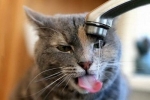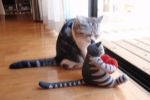
英语作文思路及模板【一】
在正文下面的`一、二行处,从信纸的中间偏右处开始,第一个词开头要大写,句末用逗号。不同的对象,结束语的写法也不同。
(1)写给家人、亲戚,用Your loving grandfather,Lovingly yours,Lovingly等;
(2)写给熟人、朋友,用Yours cordially,Yours affectionately等;
(3)写业务信函用Truely yours(Yours truely),Faithfully yours(Yours faithfully)等;
(4)对上级、长辈用Yours obediently(Obediently yours),Yours respectfully(Respectfully yours)等。
英语作文思路及模板【二】
位置在下面称呼语隔一行,是信的核心部分。因此要求正文层次分明、简单易懂。和中文信不同的是,正文中一般不用Hello!(你好!)
正文有缩进式和齐头式两种。每段书信第一行的第一个字母稍微向右缩进些,通常以五个字母为宜,每段第二行从左面顶格写起,这就是缩进式。
但美国人写信各段落往往不用缩进式,用齐头式,即每一行都从左面顶格写起。商务信件大都采用齐头式的写法。
英语作文思路及模板【三】
按要求改写句子知识点梳理
一、概述
按要求改写句子主要考查学生对句子结构的掌握以及用不同句型表达同一意思的能力。考查所涉及到的句子类型有一般疑问句、否定句、反意疑问句、选择疑问句、对划线部分提问、感叹句、保持原句意思、合并成一句、简单句和复合句之间的互换以及改为被动语态等。
二、解题时需注意的几个要点
1、时态:不同的时态相对应的助动词
一般现在时:谓语动词用原形(主语为第三人称单数时,动词加s或es,变否定句、疑问句时助动词为do或does)
一般过去时:谓语动词用过去式,变否定句、疑问句时助动词为did.
现在完成时:助动词have/has+动词的过去分词
过去完成时:助动词had+动词的过去分词
一般将来时:will/be going to +动词原形
过去将来时:would/was or were going to +动词原形
现在进行时:am/is/are+动词的现在分词
过去进行时:was/were+动词的现在分词
2、语态:主动语态变为被动语态的谓语结构
一般现在时:am/is/are+动词的过去分词
一般过去时:was/were+动词的过去分词
一般将来时:will be+动词的过去分词
情态动词:can/may/must/need等情态动词+be++动词的过去分词
3、改反意疑问句时注意hardly, never, seldom, few, little, no等词表达的是否定意义,变反意疑问句时用肯定形式。
4、在合并句子时,有些连词如not only…but also…, neither…nor…, either…or…是就近原则,连接两个主语时动词形式取决于与动词邻近的主语。而both…and…连接两个主语时,主语是复数。
5、简单句和复合句之间的互换常见的有:带有疑问词的宾语从句改为特殊疑问词+to+动词原形的不定式;结果状语从句so…that…改为enough to或too…to…的简单句。
6、保持原句意思改写句子时注意时态不变。
三、习题
练习一
1. We do our homework every evening. (改为否定句)
We _________ ________ our homework every evening. 对划线部分提问
________ ________ do they have a class meeting?
3. She could hardly understand this passage. (改为反意疑问句
She could hardly understand this passage, _________ __________?
4.The manager told him how to get useful information. (改为否定句
The manager _________ _________ him how to get useful information.
5. Tom’s sister can speak English and Japanese very well. (改为反意疑问句
Tom’s sister can speak English and Japanese very well, _________ _________?
对划线部分提问
_________ _________ he live twenty years ago?
7. Sam does some cleaning in the morning. (改为否定句
Sam _________ do _________ cleaning in the morning.
对划线部分提问
_________ _________ have the students worked on the survey?
9. Your father used to ride a bike. (改成反意问句)
Your father used to ride a bike, _______ ________? (对划线提问)
__________ ___________ the population of Germany?
11. Mr. Wang washes his car once a month. (改为一般疑问句)
Mr. Wang (对划线部分提问
will Susan come back from Athens?
13. My friends lost their way when they were traveling in Hong Kong. (改为一般疑问句
________ your friends ________ their way when they were traveling in Hong Kong?
14. 对划线部分提问
________ ________ has Yao Ming been in the Rocket Team?
15. She put the digital camera on the bed just now. (改为否定句
She _________ _________ the digital camera on the bed just now.
16. Mark's flown to Hainan Island for winter holidays. (改为反意疑问句
Mark's flown to Hainan Island for winter holidays, _________ _________?
(专辑. (划线部分提问
_________ did Super Girl Zhou Bichang _________ to Vienna?
18. I’ve already saved enough money to buy a new car. (改为否定句
I ________ saved enough money to buy a car ________.
19. Lily used to have long straight hair. (改为反意疑问句
Lily used to have long straight hair, ________ ________?
20. He has already been there .(改为一般疑问句
__________ he been there __________?
21.They decided that they wouldn't have the picnic because of the bad weather. (改为简单句
They decided __________ _________ have the picnic because of the bad
weather.
22. The English people hardly ever shake hands between the strangers .( 改为反意疑问句
The English people hardly ever shake hands between the strangers, __________ __________?
23. They grew some sunflowers in their garden last year.(改为否定句)
They __________ __________ any sunflowers in their garden last year.
24. Jane drinks milk every morning.(改为一般疑问句)
_________ Jane ___________ milk every morning? (就划线部分提问)
___________ map ___________ to Class 4?
26. You can choose only one of the two: a mini-TV or a DVD player. (改为选择疑问句
you want a mini-TV a DVD player?
27. That detective film is so amazing. (改为感叹句)
___________ ___________ amazing detective film!
28. He has some money left.(改成否定句)
He money left.
29. (划线部分提问)
do the members of the film society meet?
30. His mother knew why the little boy was unhappy all day. (改为一般疑问句
_______ his mother _______ why the boy was unhappy all day?
31. He looks very funny with that hat on. (改为感叹句
_______ _______ he looks with that hat on!. 对划线部分提问
_______ _______ they build this factory?
33. I have already finished the test paper.(改为否定句)
I ________ finished the test paper ________.
34. Johnson denied cheating in the competition.(改为反意疑问句)
Johnson denied cheating in the competition, ________ ________? (对划线部分提问) ________ ________ the story need to be funny?
36. Sam does some cleaning in the morning. (改为否定句
Sam _________ do _________ cleaning in the morning.
对划线部分提问 _________ _________ have the students worked on the survey?
38. (对划线部分提问) _________ _________ has he been a top fashion designer?
39. 对划线部分提问
________ ________ will they move into the new school?
40. to go to the People’s Square by underground. (对划线部分提问
________ _______ did it take you to go to the People’s Square by underground?
练习二:
1. Gold is less valuable than diamond. (保持句意不变
Gold is ________ ________ valuable as diamond.
2. He told the children to go and watch his tank of Ghost fish. (改为被动语态 The children ________ ________ to go and watch his tank of Ghost fish.
3. Unless I have a quiet room, I cannot do any work. (保持句意不变)
I cannot do any work ________ I _________ have a quiet room.
4. The manager arrived here a few minutes ago. (保持句意不变)
The manager has _________here ________ a few minutes.
5. They will send him to work in Japan for one year. (改为被动语态
He will ________ _________ to work in Japan for one year.
6. The words on the notice board are very small. I can’t see them clearly.(保持句子原意
The words on the notice board are small I can’t see them
clearly.
7. We can solve the problems with the help of the teacher. (改为被动语态 The problems can _________ _________ with the help of the teacher.
8. We can’t finish the work in such a short time. (保持原句意思
It’s _________ _________ us to finish the work in such a short time.
9. We must keep the noise under 50 dbs.(分贝(改成被动语态)
The noise must ________ _______ under 50 dbs here.
10. Mike doesn’t like classical music. Billy doesn’t either. (合并成一句) _________ Mike nor Billy __________ classical music.
11. The room is so dirty that we can’t live in it.(保持句意不变)
The room isn’t __________ _________ for us to live in.
12. No one knows when we will start tomorrow. (保持原句意思)
No one knows start tomorrow.
13. The Smiths will invite the professor to take part in the party. (改成被动语态 to take part in the party by the Smiths.
14. If you are not brave, you’ll lose your last chance.(保持原句意思)
you are ’ll lose your last chance.
15. They store much information in the computer. (改成被动语态
Much information ________ ________ in the computer.
16. Don’t throw rubbish here and there. Our teacher said to us. (合并为一句
Our teacher told us ________ ________ throw rubbish here and there.
17. If John doesn’t apologize for what he did, I will tell the teacher about his bad behavior.
(保持原句意思)
_______ John _______ for what he did, I will tell the teacher about his bad behavior.
18. I don't know where we can grow vegetables in the city. (改为简单句 I don't know _________ _________ grow vegetables in the city.
19. People used to enjoy themselves chatting on MSN when it worked well. (保持句意基本不变
People used to _________ a lot of _________ chatting on MSN when it worked well.
20. If you don’t improve your handwriting, you will lose marks in the exam. (合成同义句
You will lose marks in the exam ________ you ________ your handwriting.
21. To go fishing is fun. (句意不变 )
_____ is fun _____ ______ fishing.
22. Dick was so short that he couldn’t touch the top of the bookshelf.(保持句意基本不变)
Dick wasn’t __________ __________ to reach the top of the bookshelf.
23. “Can I borrow your bike for a while or not?”( 保持句意基本不变)
Tom asked his sister __________ he __________ borrow her bike or not for a while.
24. The couple couldn’t decide which flat they should choose at first. (保持原句意
思)
The couple couldn’t decide which flat at first.
25. Meaningless information is difficult for the little boy to remember. (保持原句意思)
is difficult for the little boy remember meaningless information.
26. People throw away millions of plastic bags in our city every day. (改成被动语态)
Millions of plastic bags away in our city.
27. She was so careless that she couldn’t find the mistakes in her test paper. (保持句意基本不变
She was _______ _______ to find the mistakes in her test paper.
28. We will hold the next Olympic Games in Beijing in 2008.(改为被动语态)
The next Olympic Games will _______ _______ in Beijing in 2008.
29. The elderly man pushed the birds into the river.(改为被动语态)
The birds ________ ________ into the river by the elderly man.
30. Dolphins are so clever that they can follow the instructions.(保持句意基本不变) Dolphins are ________ ________ to follow the instructions.
31. We can’t finish the work in such a short time. (保持原句意思
It’s _________ _________ us to finish the work in such a short time.
32. They invited the astronaut and his wife to the party on Christmas Eve.(改为被动语态
The astronaut and his wife _________ _________ to the party on Christmas Eve.
33. The little girl didn’t go to bed unless the grandmother told her a story. (保持句意基本不变
The little girl didn’t go to bed _________ the grandmother _________ tell her a story.
34. The plane is so big that it can carry 300 passengers at one time. (改为简单句)
The plane is big _________ _________ carry 300 passengers at one time.
35. Did they know the answer to the question? Ididn’t know… (合并为一句 I didn’t know ________ they had ________ the answer to the question.
Keys
练习一
1. don’t do 2. How often 3.could she 4.didn’t tell 5.can’t she
6.where did 7.doesn’t any 8.How long 9.didn’t he 10.What is
英语作文思路及模板【四】
Dear Mr. / Ms.,
This is to introduce Mr. Frank Jones, our new marketing specialist who will be in London from April 5 to mid April on business.
We shall appreciate any help you can give Mr. Jones and will always be happy to reciprocate.
Yours faithfully,
xxx
英语作文思路及模板【五】
位置在下面称呼语隔一行,是信的核心部分。因此要求正文层次分明、简单易懂。和中文信不同的是,正文中一般不用hello!(你好!)
正文有缩进式和齐头式两种。每段书信第一行的第一个字母稍微向右缩进些,通常以五个字母为宜,每段第二行从左面顶格写起,这就是缩进式。
但美国人写信各段落往往不用缩进式,用齐头式,即每一行都从左面顶格写起。商务信件大都采用齐头式的写法。
5、结束语(complimentary close)
在正文下面的一、二行处,从信纸的中间偏右处开始,第一个词开头要大写,句末用逗号。不同的对象,结束语的写法也不同。
(1)写给家人、亲戚,用your loving grandfather,lovingly yours,lovingly等;
(2)写给熟人、朋友,用yours cordially,yours affectionately等;
(3)写业务信函用truely yours(yours truely),faithfully yours(yours faithfully)等;
(4)对上级、长辈用yours obediently(obediently yours),yours respectfully(respectfully yours)等。
英语作文思路及模板【六】
指发信人的姓名(单位名称)、地址和日期,一般写在信纸的右上角。一般公函或商业信函的信纸上都印有单位或公司的名称、地址、电话号码等,因此就只需在信头下面的右边写上写信日期就可以了。
英文地址的写法与中文完全不同,地址的名称按从小到大的顺序:第一行写门牌号码和街名;第二行写县、市、省、州、邮编、国名;然后再写日期。标点符号一般在每一行的末尾都不用,但在每一行的之间,该用的还要用,例如在写日期的时候。
日期的写法,如1997年7月30日,英文为:July 30,1997(最为普遍); July 30th,1997;30th July,1997等。1997不可写成97。











